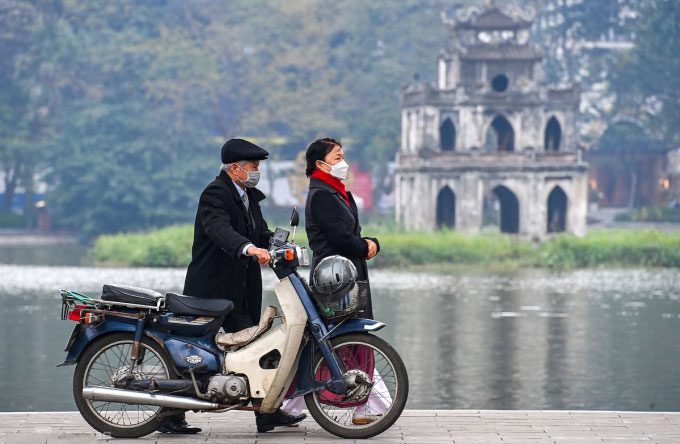Keeping the body warm, enhancing nutrition, staying active, and avoiding crowded places or close contact with infected individuals are essential ways to protect oneself during cold weather.
Dr. Dinh The Tien from the General Internal Medicine Department at Duc Giang General Hospital (Hanoi) states that cold weather creates a favorable environment for various viruses and bacteria that cause flu to thrive, increasing the risk of respiratory illnesses, asthma, chronic obstructive pulmonary disease, as well as the risk of stroke and gastrointestinal bleeding, especially among individuals with underlying health conditions, the elderly, and children.
Moreover, the elderly are more susceptible to joint pain; young children, individuals under the influence of alcohol, those with malnutrition, cardiovascular issues, or hypothyroidism are at risk of hypothermia. Cold weather reduces human immunity, making individuals more prone to pain, throat discomfort while swallowing, fever, hoarseness, coughing, runny nose, and fatigue, requiring more energy to adapt.
Additionally, Hanoi and several northern provinces are experiencing outbreaks of diseases like dengue fever and flu. According to Dr. Tien, this year has seen erratic weather patterns; for instance, Influenza A has resurfaced in the summer, while winter has not yet brought a prolonged cold spell, yet many people are falling seriously ill.
Other risk factors include pollution, dust, traffic jams, a sedentary lifestyle, high consumption of fast food, and work or study-related stress, all of which contribute to an increased risk of illness. Particularly after COVID-19 was brought under control and daily activities returned to normal, the public has become more complacent about disease prevention, such as not wearing masks or regularly sanitizing hands…
On the other hand, unscientific disease prevention methods are also risk factors that exacerbate health conditions during sudden cold weather, according to Dr. Cao Minh Thanh, Head of the Ear, Nose, and Throat Department at Hanoi Medical University Hospital. For example, wearing excessively thick and layered clothing can cause children to sweat, making it difficult to breathe. Sweat that seeps back into the body can lead to chills, lower body temperature, and increase the risk of pneumonia.
Moreover, many families use charcoal stoves for heating during cold weather. However, in poorly ventilated spaces like bedrooms, burning charcoal can produce highly toxic carbon monoxide (CO), posing risks of brain damage, neurological issues, heart rhythm problems, coma, or even death.

From November 30, the monsoon will sweep across the northern provinces. This is the coldest spell since the beginning of winter. (Photo: Giang Huy).
Doctors advise that when the weather turns cold, individuals need to keep warm, especially the hands, chest, neck, and head; when riding a motorbike or working outdoors in the early morning or at night, appropriate warm clothing is essential. Avoid close contact with individuals showing signs of infectious diseases. Wear masks whenever going outside and limit visits to crowded places.
Ensure personal hygiene by regularly washing hands with soap and cleaning the nose and throat daily with saline solution. Clean and maintain hygiene in the home, especially with items (cups, bowls, utensils…) when someone is ill in the family.
For high-risk groups such as young children, flu vaccinations should be administered two months in advance, and the elderly should adhere to treatment for underlying health conditions, avoid self-discontinuing medications, manage blood pressure effectively, monitor health indicators regularly, and control cholesterol levels.
Children need to be kept warm, especially their feet, chest, neck, and head, avoiding exposure to wind and outdoor activities at night. They should not be overly bundled, and caregivers should frequently check for sweating to dry or change clothes as needed. For infants, diapers should be changed regularly to prevent them from getting cold due to prolonged wetness. Parents should also avoid using essential oils on children’s skin (to prevent respiratory illnesses) as children’s skin is very sensitive and may cause rashes, irritation, or allergies. Absolutely do not use charcoal burning to warm children, as it may lead to carbon monoxide poisoning.
Ensure proper nutrition by consuming plenty of fruits to boost vitamin intake and enhance immunity. Maintain a balanced diet including carbohydrates, proteins, fats, vitamins, and minerals. Drink warm water and avoid consuming food or drinks directly from the refrigerator.
Increase physical activity and exercise; limit morning workouts as they can lead to strokes, especially in the elderly. Exercise outdoors in sunny areas with shade, warm up properly, and wear comfortable clothing that is neither too thin nor too thick.
Doctors predict that in the coming time, especially as the Tet holiday approaches, the number of children and elderly individuals suffering from respiratory and infectious diseases may rise. However, individuals with seasonal flu can care for themselves at home, managing symptoms by drinking plenty of fluids and using fever-reducing medications as directed by a doctor.
If severe symptoms arise, such as persistent high fever, fatigue, restlessness, discomfort, headache, or nausea, it is necessary to seek hospital care. Do not self-prescribe medications, stockpile, or use antiviral drugs without medical advice. Avoid self-administering IVs or home testing, which can lead to unnecessary expenses and misdiagnosis.



















































